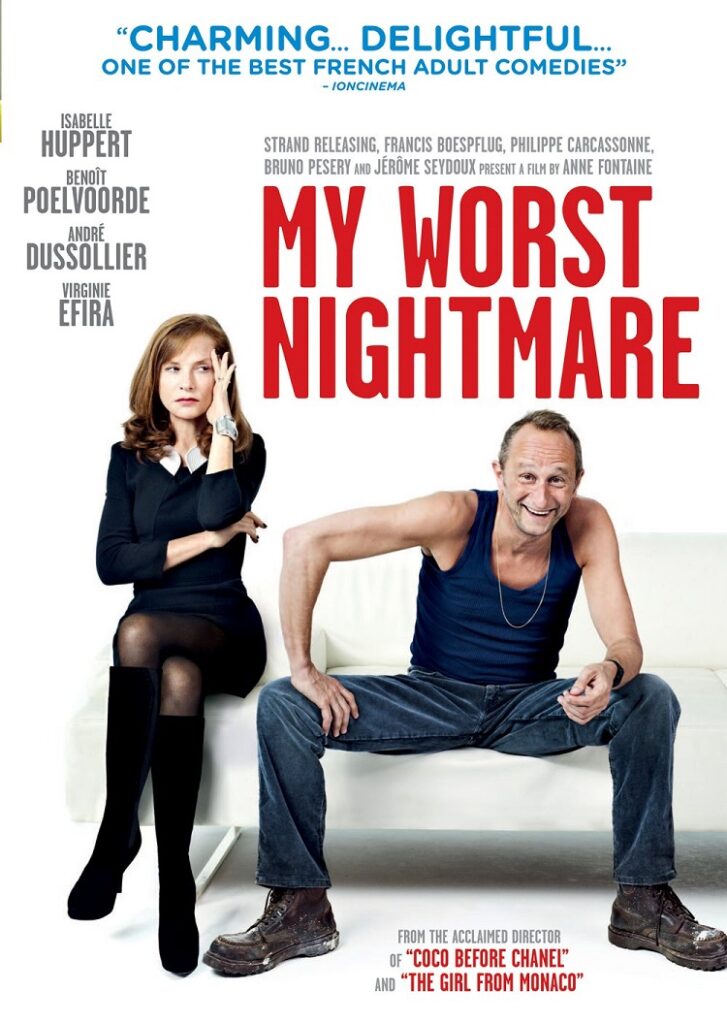
A French romantic comedy that wholeheartedly and gleefully embraces almost every cliché of its American genre counterparts, My Worst Nightmare is an entertaining diversion. Directed by Anne Fontaine, who brought us Coco Before Chanel, this 2011 picture deals in the sorts of familiar relationship complications audiences are used to and traffics in class struggle.
For Fontaine, the plan was to craft a film about a mismatched couple that centred on two specifically-chosen performers in the key roles. That meant bringing in the frenetic Benoît Poelvoorde and the ceaselessly classy Isabelle Huppert. “I wanted these two actors and no one else,” says Fontaine. “With them, I was certain that a feeling of authenticity would come through…”
We’re introduced to Huppert’s Agathe first. She is an art dealer living the high life in Paris with her wealthy husband François (André Dussollier) and son (Donatien Suner). During a meeting at her son’s school, Agathe meets the volatile Patrick (Poelvoorde) and is almost instantly thrust into his world of chaos, womanizing, drinking, and crudeness.
The lives of Agathe and Patrick could not be more different, but for the relationship between their two sons, and they find themselves cast into a whirlwind of possibilities, misunderstandings and odd behaviour. When Julie (Virginie Efira) enters the picture, things become even more complicated and Agathe has to restructure her defence mechanisms.
On its surface, My Worst Nightmare is a fairly average rom-com. But Fontaine has gathered some truly tremendous performers and lines the screenplay, penned by her and Nicolas Mercier, with sharp dialogue and some rather clever clashes between classes. For Agathe, the idea that her vacuum-sealed world would be so thrust into turmoil seems impossible. For Patrick, his defensive posturing under the comfort of alcohol and boobs is really no different.
What we have, then, is a film about breaking down facades. The romantic angles come and go, but what Fontaine really accomplishes is a comedy about transformation. Sometimes these changes are on the subtle side, while other alterations require sweeping gestures. When Agathe almost lovingly illustrates Patrick’s “ladies’ aquarium” in full watery glory, we’re a long way from arguments over black.
Fontaine is mostly fixated on the comedy, though, and that’s where Poelvoorde really shines. He is a classic schmuck, but he differs from the standard farcical stereotype in a number of ways. Witness the conversation he shares with Agathe at Ikea. He has an obvious drinking problem (who has three beers at Ikea?) and labours under severe self-loathing, yet his crassness is almost as hypnotic as his bumbling.
This clash of classes has happened in films before, of course, and they tend to form the basis of many romantic comedies. But in the case of My Worst Nightmare, Fontaine prances elatedly through the stereotypes with a decidedly French bent. This is exemplified wonderfully when Patrick informs his companions that he’s just had a “winegasm.”
This picture has all the opportunism and crassness of similar American movies and it may not provide much by way of new ground for viewers, but it seems self-aware enough to escape the shortfalls. Fontaine, who has veered close to complete comedy with 2008’s The Girl From Monaco, embraces the genre well and the performers fall into place for a very funny, very entertaining treat.